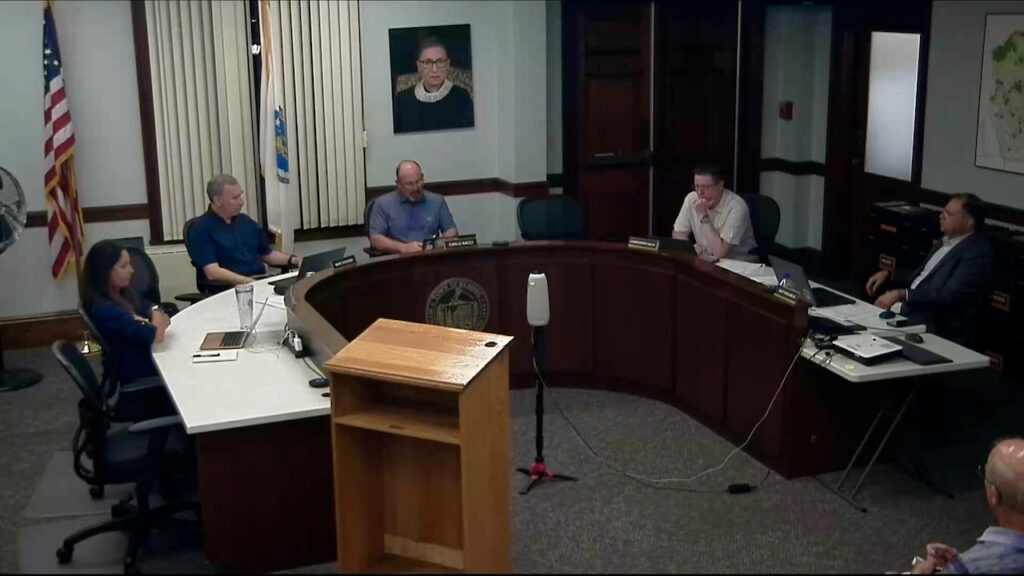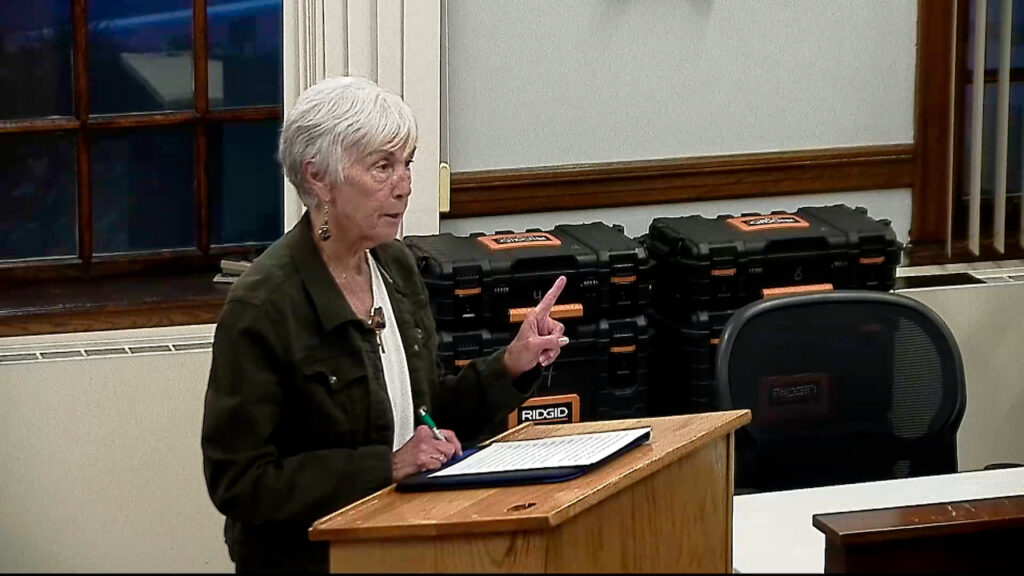FY25 Water & Sewer Rates

Reading, MA — After much discussion, the Select Board voted 4-1, with Select Board member Christopher Haley as the dissenting vote, to raise the water rates in town by 3.75% for Fiscal Year 2025. The new rates will be reflected in the bill residents receive in December of 2024. The average water bill will rise from between $6.22 and $8.30 a bill or $25 to $37 for the entire year. The board will be retaining the four tiers of billing based upon usage. The new tiers range from $11.15 per 100 cubic feet of usage for tier one to $12.47 per 100 cubic feet for tier four.
Sewer rates were raised by 3%, also by a 4-1 vote. The average sewer bill will rise from between $4.73 and $7.07 per bill, or $18.92 to $28.28 annually. The four tiers for sewer rates will begin at $10.01 per 100 cubic feet for tier one usage to $12.36 per 100 cubic feet for tier four. By a vote of 5-0, the stormwater rate will remain $60 per household for the year.
Town-of-Reading-FY-2025-Water-and-Sewer-Rate-StudysmThe retained water funds account will use $600,000 to mitigate rate increases, while the sewer fund will use $1.35 million. Town meeting approved these amounts as part of the Fiscal Year 2025 budget.
These decisions were reached after consultant Matt Abrahams provided a similar presentation to the one presented in the May 7 Select Board meeting. This presentation highlighted how differing rates, using retained funds to support rates, and planned capital expenditures would affect the level of retained funds over the next ten years. Currently, Reading has $4.7 million in retained water funds, which is 58.5% of annual fund expenditures. The town has $7.3 million in retained sewer funds, which is 99.1% of fund expenditures. Reading policy recommends keeping these funds at or above 30%.
Chief Financial Officer Sharon Angstrom explained that keeping a healthy balance in these funds will allow the town flexibility in funding future capital improvements. As an example, the funds could be used to prevent the town from having to incur unfavorable future debt for some significant capital projects planned for 2031. Abrahams also noted that the proposed rate increases are lower than some other towns, including Winchester, which is proposing a 9% increase in water and sewer rates.

During public comment, resident Cathy Zeek stated that the town’s tiered rate system for the current fiscal year is “a clear inequity” for those who live in large apartment developments as they are charged the tier four rate as a building regardless of individual unit water usage. She urged the board to correct the system before determining rates. Abrahams noted that a building like the Postmark building could save around $2,000 annually on its water bill and $2,100 annually on its sewer bill if the tiered system were changed in the manner suggested, saving each unit approximately $40 a year on each bill.
“I would be curious what it would cost the town to just go into our billing system and fix it. That seems like the easiest solution,” Select Board member Melissa Murphy suggested.
Town Manager Matt Kraunelis indicated that it would be labor intensive at first, given that the town has no system for measuring the water usage of individual units. Several of the buildings do have internal systems for measuring usage. Angstrom stated that she believes that the town’s software could be adapted to do as Murphy suggested, though it would take time to do so. A decision would have to be made to determine how many units a building would need to have to qualify for the changes. Member Mark Dockser indicated interest in forming an official Department of Public Works advisory group to study the issue and the various options, then bring a recommendation back to the board.
Haley reiterated his concern from the previous year that the tired system “penalizes” large families who are bound to have more water usage, thus incurring higher rates. He also complained about the Massachusetts Water Resources Authority billing system, which he believes penalizes the town for conservation efforts financially. While agreeing that the system seems wrong, Dockser responded that conservation is still vital as water is a finite resource. He argued that the flat water and sewer rate system penalizes small families.
After indicating that he did not want to vote on rates until some of these issues were resolved, Haley chose to vote against the rate changes as proposed. The board did commit to discussing the tiered system and other issues, such as dual water meters, at a future meeting.
Open Meeting Law Complaint

The Select Board began the meeting with an executive session to discuss an open meeting law complaint filed by resident Daniel Dewar. In the motion, resident Mark Delany was invited to join the executive session. Select Board member Karen Herrick questioned inviting a member of the public to the executive session and suggested that the discussion on the complaint could instead be held in public session.
Town Counsel Ivria Fried shared that inviting a member of the public to an executive session was “atypical,” but it is allowed under the law. Herrick chose to abstain from the vote to go into executive session, while Dockser voted against the motion. Upon return to open session, Bacci shared that the board would issue a response to the complaint but that there would be no public discussion of the matter.
RCTV and the Reading Post
The board moved on to a discussion regarding the relationship between RCTV and the Post. Chair Carlo Bacci explained that he was concerned over allegations that the Post changed time stamps on certain letters to the editor on its web page. Haley stated that he had contacted RCTV Executive Director Philip Rushworth over the issue and received notice that the Post considers the issue closed. Dockser questioned why the town’s contract with RCTV was on the agenda, as the issue in question seemed to have little to do with the contract for services. Bacci explained that the contract was on the agenda to allow the board to discuss it if necessary.
RCTV board president Chris Cridler stated that the Select Board was welcome to suggest a meeting between the two boards at any time but that requests for meetings should be between the boards as the contract stipulates and not through individual members. RCTV is scheduled to give its annual update to the Select Board in September.
Traffic Rules and Regulations
The board voted 5-0 to approve a traffic amendment restricting overnight parking on public ways for commercial vehicles rated class three and above. Class three vehicles are commercial vehicles with a gross weight over 10,000 pounds. The board also voted 5-0 to grant an easement that was approved by the Town Meeting, allowing RMLD to bring electricity to the Gazebo Circle pump station.
Annual budget requests for boards and committees
The board voted 5-0 to approve budget allotments to the Climate Advisory Committee for $1,000, the Conservation Commission for $6,000, the Historical Commission for $1,500, the Town Forest Committee for $6,500, and the Trails Committee for $5,000. This funding was approved in the FY 2025 budget by Town Meeting for Select Board dispersal.
Conservation Administrator Chuck Tirone suggested that the Town Forest Committee needed significant additional funds to facilitate the removal of dead and dying red pine trees in the Town Forest as they continue to be a hazard. He also suggested that the committee needs additional funds to hire a landscape architect to create a long-term forest sustainability plan. Dockser suggested that the committee could either request the funding from Town Meeting or the Finance Committee.
Reading Center for Active Living Committee
Dockser reported that the Permanent Building Committee has accepted the Senior Center project and will seek to establish a committee to move the project forward. The Select Board voted 5-0 to extend the Reading Center for Active Living committee’s sunset date into August to allow it to submit its final report to the board.
Kraunelis announced in his report that the town had hired Jayne Wellman as the new Assistant Town Manager. Wellman has worked for the town for eight years in various roles.
The Select Board adjourned at 12:10 am.
